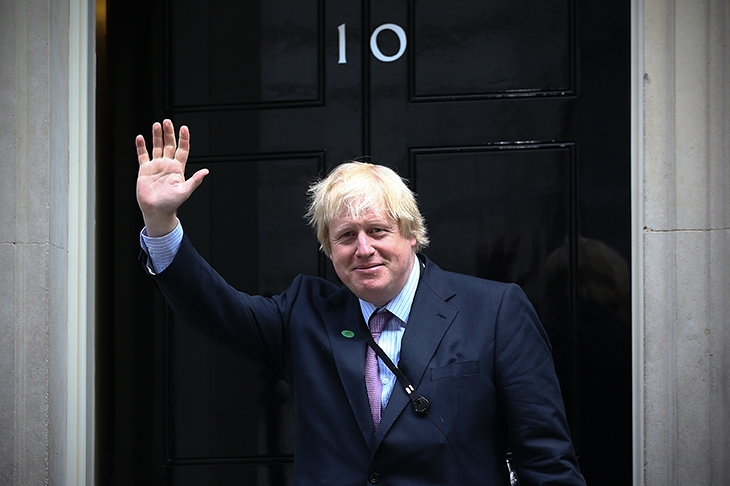Back when Boris Johnson was editor of this magazine and MP for Henley, I was with him at a Tory party conference in Bournemouth. He was about to speak at a meeting on transport policy. An intern rushed up with some random downloaded pages, having evidently been told to Google ‘transport policy’. Boris grasped the papers, ran his hands through his hair, revved the rhetorical engine, launched into an old gag about how many times his bicycle had been stolen — and brought the house down. His improvisations swooped, soared, hit and missed for a hilarious quarter-hour before the big finish: ‘Jogging along your lovely seafront here in… ah, err, Bournemouth this morning, I came across a padlocked kiosk that bore a sign saying “This kiosk is alarmed”. Ladies and gentlemen, if even the humble seaside kiosk is alarmed, shouldn’t we all be alarmed… about the state of… ah, err… our transport policy!’
How the crowd roared. The episode, and the technique behind it, came to mind this week as I tried to make sense of our prime-minister-in-waiting’s campaign pledges, which have been designed to make him sound friendlier to business than was previously thought. His promise to ‘save our high streets’ by ‘immediately unlocking’ a £675 million fund already announced by Philip Hammond was a low-hanging fruit — and less helpful for struggling entrepreneurs than his rival Jeremy Hunt’s wider offer to slash business rates and corporation tax. But it was accompanied by nitty-gritty measures — to curb cash-machine closures and overhaul planning rules that restrict changes of use for commercial premises — that it’s easy to imagine Boris grasping out of the hand of the intern who came up with them seconds before reading them out from the podium.
Then there’s his proposal in the Telegraph this week to give preferential tax treatment to companies that look after their employees’ mental health; apart from a couple of brushstrokes about Churchill’s ‘Black Dog’, that one didn’t sound like Boris at all. And his embrace of ‘free ports’ — potentially in Teesside, Grimsby, Belfast, Bristol and Aberdeen — where goods would be imported and exported without tariffs and employers would enjoy special tax breaks. Terrific opportunity to talk about ‘turbocharging’ the regions; one of the team says he’s read a thinktank paper on it; onwards to victory.
Too cynical? Perhaps Johnson spent his wilderness year after resigning as foreign secretary brainstorming reforms that really will defibrillate the post-Brexit economy. Or perhaps most of them will evaporate as fast as they were devised and as soon as the Treasury does a cost-benefit analysis, while the new prime minister denies he ever said any such thing. Either way, if you have a pet tax wheeze and a line to someone on the Boris bus, phone it in: there’s still time for him to announce it as his own. But as the greatest improviser of our time walks with destiny next week, ladies and gentlemen, shouldn’t we all be alarmed?
Bring back the Fat Controller
‘Government should not manage railways’ says a BBC headline this week. ‘Cancelled, delayed, cancelled’ says the departure board at York as I try to reach Birmingham to meet some more of our excellent Economic Disruptor finalists. No industry could be in greater need of disruption than our rail network, crippled as it is by the Department for Transport’s ill-designed franchise policy and the incompetence of nationalised Network Rail. Now a review by former British Airways chief Keith Williams says the DfT must step back and a new independent body should be created to provide unified day-to-day management, while franchisees should have longer contracts but also be held to performance and punctuality targets.
If all this sounds like a reinvention of the Strategic Rail Authority that was scrapped by the Labour government in 2006, it also recalls the Fat Controller of fiction, much favoured by this column over the years. I fear my predecessor Christopher Fildes’s railway correspondent I.K. Gricer is too old and too thin to apply for the job, but I’m not: I’ll pop my CV in the post just as soon as I can get off this bloody train.
Bad for bioscience
The Woodford debacle rumbles on. Investors are still trapped in fallen-star fund manager Neil Woodford’s Equity Income fund which closed for redemptions last month; Woodford himself is still charging full fees on the fund and refusing to speak to the media, and regulators seem powerless to intervene. It’s all bad for the reputation of the funds industry — and, as I observed when the story broke, it’s particularly bad for UK bioscience, in which Woodford was one of the few early-stage investors.
Recent conversations confirm the picture. Among top UK investment firms, only a handful besides Woodford declare themselves to be investors in biotech. One specialist put it to me that the typical British investor still prefers ‘empire sectors’ (finance, oil, mining, shipping, defence) and ‘softer stuff’ (media, fashion) while our scientists themselves are often hampered by ‘leftist disdain for monetising healthcare’. Meanwhile, the EU regulatory straitjacket known as Mifid 2 has squeezed the life out of small-company investment, leaving listed UK biotech companies (the likes of Angle and Avacta in our Optimists portfolio) at low valuations that hamper their ability to raise more capital. There’s hope of attracting that capital from the US and China, but that’s a mixed blessing if it drags the companies inexorably towards foreign ownership.
I wrote recently that despite the talent of Brits such as Jony Ive of Apple, the UK has played a remarkably small part in the digital revolution. Unless the Woodford episode is swiftly sorted, other UK investment professionals awake to the bargains available, and someone persuades Boris that ‘backing boffins’ makes a good speech line — then the best of bioscience will be the next piece of British genius to end up abroad.







Comments